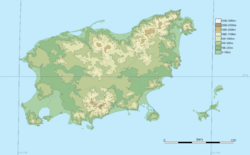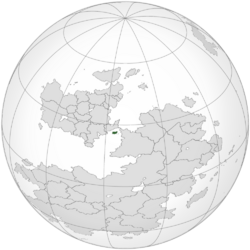User:Noodles/Sandbox2
This article is incomplete because it is pending further input from participants, or it is a work-in-progress by one author. Please comment on this article's talk page to share your input, comments and questions. Note: To contribute to this article, you may need to seek help from the author(s) of this page. |
Republic of Emessa Repubblika ta' Imisra | |
|---|---|
Motto: Viribus Unitis "With United Forces" | |
 | |
 | |
| Capital and largest city | Himera |
| Official languages | Emessan |
| Recognised national languages | Atudite |
| Recognised regional languages | |
| Demonym(s) | Emessan |
| Government | Unitary parliamentary republic |
• President | Placeholder McPresident |
• Minister President | Placeholder |
| Senate | |
| Establishment | |
• Colonisation by Etruria | 1843 |
• Incorporation as an Etrurian State | 1888 |
• Independence Wars | 1943-1946 |
• Trust Territory of Emessa | 1946-1949 |
• Emessan Independence | 1949 |
| Area | |
• | 22,487 km2 (8,682 sq mi) |
• Water (%) | 3.1 |
| Population | |
• Estimate | 5,681,900 |
• 2015 census | |
• Density | 247.8/km2 (641.8/sq mi) |
| GDP (PPP) | 2020 estimate |
• Total | |
• Per capita | |
| GDP (nominal) | 2020 estimate |
• Total | |
• Per capita | |
| Gini (2020) | medium |
| HDI (2020) | very high |
| Currency | Emessan Lira (EML) |
| Date format | dd.mm.yyyy |
| Driving side | right |
| Internet TLD | .em |
Emessa (/ˈɛməsə/ E-mə-sə, officially the Rebublic of Emessa (Emessan: Repubblika ta' Imisra [rɛˈpʊbːlɪkɐ tɐ ˈɑmɑsˤɾ]) is a transcontinental country in the Solarian Sea, halfway between Southeast Euclea and Northwest Coius. It lies 94 km (58 mi) southeast of Paretia, 100 km (62 mi) west of Tsabara and 179 km (111 mi) east of Etruria. Emessa's location at the crossroads of the Euclean and Coian continents has shaped its rich history and shaped a national identity of religious and ethnic diversity. The official language is Emessan, a language related to Rahelian and Atudite, yet distinct due to its heavily solaricized traits.
Emessa has been continuously inhabited since the Paleolithic age. Owing to their strategic location in the middle of the Solarian Sea, the islands have been contested and ruled by a succession of powers, from the Nimene Civilisation in the Late Bronze Age to foreign empires, such as the Atudites, Piraeans, Solarians, Arsanids, Crusaders, and, more recently, Etruria and Gaullica. As a result, Emessa is home to a diverse mix of cultures and influences, with many archaeological and historical sites of differing traditions. Historically, the region has been controlled by a mix of Judicates and merchant city-states, with the regional power structure in the Middle Ages being largely derived from late Sotirian administration, instead of feudal power dynamics more common in Euclea.
|Etrurian presence in the archipelago began in 1378, with the conquest of the port city of Nineve by the thalassocratic Republic of Accadia. This lead to increased influence of Etrurian maritime republics in the Bay of Povelia, with various other ports becoming afilliated to such republics, notably the Republic of Accadia, the Republic of Amelia and Povelia. With the War of the Amelian League in 1450, Povelia gained significant concessions in the island, with near-absolute hegemony in Emessa's trading ports. To secure this position, Povelia turned Himera into a large fortified trading hub directly under its control, while influencing the various Emessan Judicates. This influence was disputed with various Rahelian sheikhdoms and, later, Crusading States predominantly of Gaullican sponsorship. Etrurian rule of Emessa formally began in 1814, with the conquest of Himera and the eventual complete control of the island in 1843. The islands saw fighting during the Battle of Emessa in the Great War and again in the Solarian War, also called War of Independence in the country. Emessa became a joint trust territory, and achieved independence in 1949.
Today, Emessa is a parliamentary democracy with confessionalist characteristics, with most parties representing either of the islands' religious communities: Sotirianity, Irfan, and Atudism. Despite periods of troubles, the country has remained fairly calm and prosperous, with a upper middle income economy driven by the tertiary sector, notably tourism and banking, and a high human development index. Emessa is a member of the Community of Nations, the Aurean Forum, the International Council for Democracy, the International Trade Organisation, and the Global Institute for Fiscal Affairs. Historically maintaining a policy of armed neutrality, the country has nonetheless moved closer to the Euclean Community since the Alban War, with accession negotiations being underway since 2012.
History
Pre-Historic Emessa
Bronze Age
- Late Bronze Age maritime civilization
- Atudite Conquest
- Piraean Colonies
Solarian Period
- Solarian Period and Disputes with the Arsanids
Middle Ages
- Independent Judicates and Maritime Republic ports
Early Modern Period
- Irfanic Conquest
- Colonization
Modern Period
- Solarian Wars and Independence

